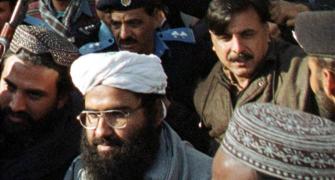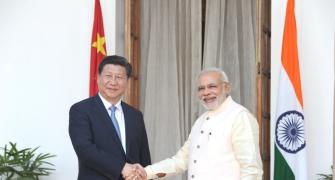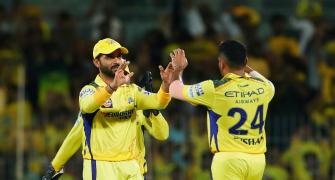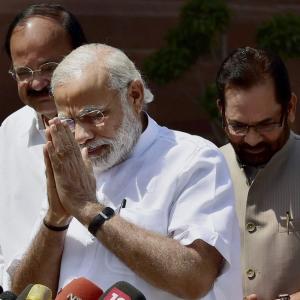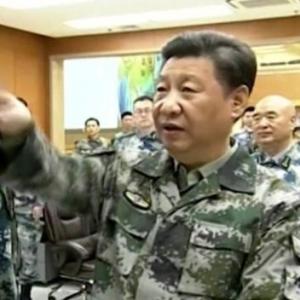Before the 2014 Lok Sabha elections, Modi had criticised Manmohan Singh's policy towards China and promised a more strong-willed policy. Those claims are now under a cloud.
Archis Mohan reports.
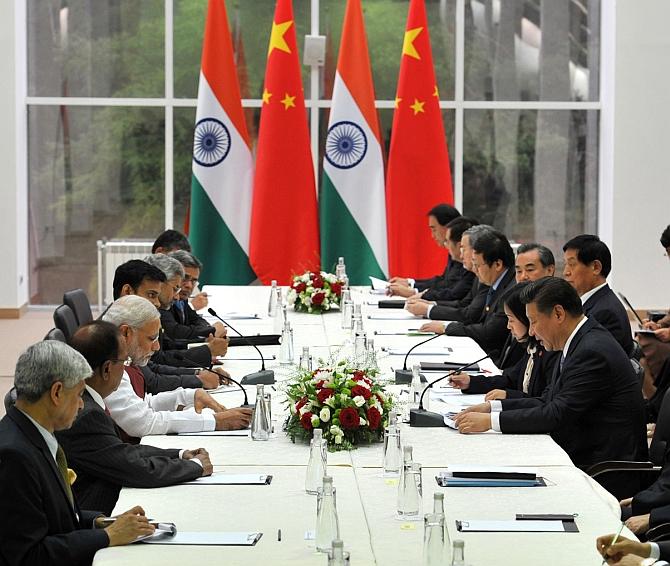
The Narendra Modi government's U-turn on issuing a visa to Uyghur dissident Dolkun Isa to attend a China-focused conference on democracy in Dharamsala, also seat of the Tibetan government in exile, and later refusing visas to two other Chinese dissidents, has brought it national and international embarrassment.
It has been widely speculated, and is yet to be denied by the external affairs ministry, that at least Isa's visa was withdrawn because of pressure from Beijing.
Government sources, however, attributed other reasons for denying visas to Chinese dissidents and pro-democracy activists Ray Wong and Lu Jinghua on 'inconsistencies' in their documents. They claimed Lu's 'documents were illegible and there was inconsistency with the purpose of her visit.' In Ray's case, 'there was data inconsistency in his documents.'
The Uyghur leader, now a German national, is executive committee chairman of the World Uyghur Congress. The organisation represents Muslim ethnic groups of the Uyghur province of China. Beijing considers it a terrorist outfit and had issued a global notice nearly a decade earlier to seek Isa's arrest. However, he continues to travel widely across the world.
Lu, known for her role in the 1989 Tiananmen Square protests, figures on a Chinese list of 'major criminals.' She is now a US citizen. Ray is a Hong Kong-based pro-democracy activist.
While Isa has gone on record to state Delhi succumbed to pressure from China, Lu got to know of the visa being rejected only when she was about to board a flight from New York on Monday. The 54 year old termed the treatment as harassment and said she was 'very disappointed' with India.
A Chinese foreign ministry spokeswoman said Isa was a terrorist, the subject of a 'red corner' notice from Interpol and the Chinese police. 'Bringing him to justice is the due obligation of relevant countries,' she said.
In Delhi, the apparent nonchalance of the ministries of home and external affairs on the issue soon turned into panic.
The MEA spokesperson said the Uyghur leader had applied and was granted a tourist visa when coming to India to attend a conference, which under the tourist visa rules is not permitted.
Until the statement by China, the Modi government was being lionised in social media with the hashtag #ModiSlapsChina. Many saw a visa to Isa as the Modi government slapping Beijing for supporting Pakistan in blocking India's attempt to have Masood Azhar, apparent mastermind of the Pathankot airbase terrorist attack in January, designated an international terrorist.
As the Washington Post put in a write-up earlier this week, the 'patriotic chest thumping over the weekend in India gave way to embarrassment and bitterness,' with #ModiBowsToChina being a top trending hashtag on Twitter.
In the run-up to the 2014 Lok Sabha elections, the now-ruling Bharatiya Janata Party and Modi had criticised the 'weak-kneed' foreign policy of the then Manmohan Singh-led government towards China. And promised a more strong-willed policy. Those claims are now under a cloud.
The current government has continued with the policy of keeping China 'engaged.'
In November 2011, the UPA government had postponed a key India-China meeting in Delhi as it coincided with a world Buddhist conference. Several top Union ministers, including the then PM, were scheduled to attend the conference but stayed away once Beijing flagged the issue. Similarly, India kept the Dalai Lama away from the Nalanda university project.
On Friday, April 29, China's State-run Global Times pointed to recent efforts by Delhi to forge closer defence ties with Washington and at the same time trying to step up a dialogue with Beijing as 'self-contradictory actions,' which could land it in a 'difficult position.'
In the Rajya Sabha, former diplomat Pavan Verma criticised the government for not waking up to the strategic import of the recent Nepal-China treaty to build multiple train routes between Nepal and China. He said the government suffered from 'diplomatic complacency.'
IMAGE: Prime Minister Narendra Modi and Chinese President Xi Jinping at a delegation-level meeting in Ufa, Russia, July 2015. Photograph: Press Information Bureau



